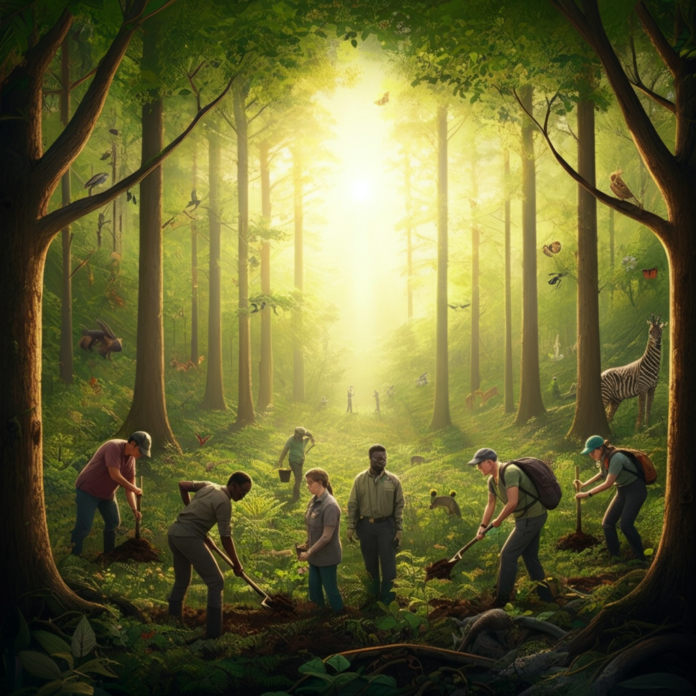Forests are often referred to as the lungs of our planet, playing a vital role in maintaining ecological balance. Yet, deforestation continues at an alarming rate. According to the World Bank, the earth has lost over 1.3 million square kilometers of forest since 1990—an area larger than South Africa. The conclusion of deforestation is not just an environmental concern; it’s a matter of survival for countless species, local communities, and even the global economy. If we fail to act, the consequences of deforestation will be irreversible.
This blog explores the causes, consequences, and solutions to deforestation, emphasizing the responsibilities of stakeholders and the potential for a sustainable future.
What is Deforestation?
Deforestation is the large-scale clearing of forests, where trees are permanently removed to make way for agriculture, urbanization, or other activities. While deforestation has existed for centuries, industrialization and growing human demands have accelerated the process in the last few decades.
Causes of Deforestation
- Agricultural Expansion: Over 80% of global deforestation is driven by agricultural activities, including cattle ranching, palm oil production, and soybean farming.
- Logging: Both legal and illegal logging for wood products lead to massive forest loss every year.
- Urbanization and Infrastructure Development: Expanding cities, roadways, and hydroelectric projects often come at the expense of forests.
- Mining: Mineral extraction destroys forests and disrupts ecosystems in mining zones.
Areas Most Affected
Deforestation hotspots include the Amazon Rainforest, Southeast Asian forests, and the Congo Basin. These regions are globally significant for their biodiversity and carbon-sequestration capabilities. Losing these forests would mean losing crucial ecological services that help stabilize the world’s climate.
The Alarming Impact of Deforestation
The consequences of deforestation are far-reaching and devastating.
Environmental Consequences
- Loss of Biodiversity
Forests are home to 80% of terrestrial species. When trees are felled, ecosystems collapse, pushing countless species toward extinction. A UN study estimates that one million species are at risk of extinction, many due to habitat loss from deforestation.
- Climate Change
Deforestation releases carbon dioxide (CO2) stored in trees, contributing significantly to global warming. Forests act as carbon sinks, absorbing nearly 2.6 billion tons of CO2 annually. Destroying them accelerates climate change.
- Soil Erosion and Water Cycle Disruption
Tree roots stabilize soil, and forests regulate local and global water cycles. Without them, areas often experience increased flooding, droughts, and land degradation.
Social and Economic Impacts
- Impacts on Indigenous Communities
Indigenous peoples rely on forests for everything from shelter and food to cultural identity. When forests are destroyed, these communities are displaced and lose their traditional ways of life.
- Economic Costs
Deforestation harms industries reliant on forest resources, like eco-tourism and sustainable forestry. Additionally, worsening climate change increases financial strain on governments and individuals due to extreme weather events.
Solutions to Combat Deforestation
While the challenges are immense, solutions exist to halt and reverse the damage.
Global Initiatives and Policies
- REDD+ (Reducing Emissions from Deforestation and Forest Degradation)
This UN initiative incentivizes developing countries to protect forests by financially rewarding them for reducing emissions caused by forest loss.
- Forest Conservation Agreements
Nations like Norway have committed billions to prevent deforestation in countries such as Brazil and Indonesia, showcasing the power of international collaboration.
Success Stories
- The Amazon Fund (Brazil)
Launched in 2008, this initiative has helped preserve over 800,000 square kilometers of rainforest, significantly curbing deforestation in the region.
- China’s Great Green Wall
This large-scale afforestation project has planted billions of trees, targeting desertification and successfully restoring ecosystems.
- Agroforestry Projects in Africa
Countries like Kenya and Tanzania combat deforestation by combining agricultural practices with forest conservation, benefiting both farmers and the environment.
The Role of Stakeholders
Success in curbing deforestation depends on collective action from all stakeholders.
Governments
Authorities must enforce anti-deforestation laws, designate protected areas, and promote sustainable land-use practices.
Corporations
Businesses must adopt ethical supply chains, ensuring their products do not contribute to deforestation. Many global companies, including Nestlé, have pledged to eliminate deforestation from their supply chains.
Individuals
Individuals can make a difference too. Small actions like reducing paper and palm oil consumption, supporting brands committed to sustainability, and planting trees can collectively have a meaningful impact.
Collaboration is Key
Environmentalists, governments, and corporations must work together to develop long-term sustainable solutions. This could include technologies like satellite monitoring for illegal logging and implementing robust certification programs like FSC (Forest Stewardship Council) for sustainable forest management.
What Lies Ahead?
If Current Trends Continue
If deforestation persists at the current rate, experts predict the loss of virtually all tropical forests by the end of the 21st century. This would have catastrophic consequences—accelerated climate change, food insecurity due to disrupted agriculture, and mass extinction rates of wildlife.
A Sustainable Future is Possible
However, reversing deforestation is achievable. A future with restored forests would mean cleaner air, richer biodiversity, and a stable climate. It’s a future where forests thrive not just as natural ecosystems, but as pillars of human and environmental health.
How You Can Contribute
Protecting forests is not just a global responsibility; it’s a personal one. Here’s how you can take part in the solution today:
- Support NGOs like WWF and Rainforest Alliance that are actively fighting deforestation.
- Reduce your carbon footprint through mindful consumption and waste reduction.
- Push for policy change by signing petitions and advocating for stricter deforestation laws.
- Educate others—share information, raise awareness, and inspire action.
A Call to Action for a Greener World
The conclusion of deforestation does not have to be a somber one. By addressing the root causes, fostering global collaboration, and implementing technological and policy-driven solutions, we can turn the tide on forest loss. The time to act is now—future generations and the planet depend on it.
Make a pledge today to protect the world’s forests and support initiatives that enable a sustainable, greener world. Together, we can ensure forests remain a source of life for generations to come.


